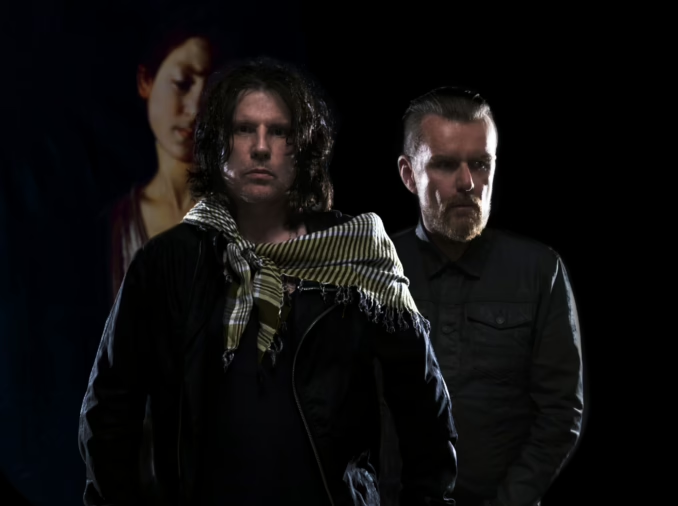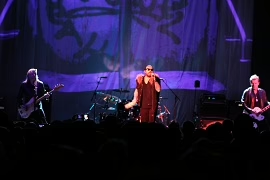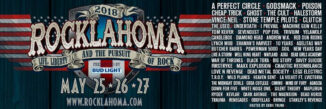
The Cult have just released their best album in years, Hidden City. Mick Burgess caught up with guitarist Billy Duffy during their current UK tour to talk about the album and the tour.
You’re current UK tour is now well underway. How have the shows been going so far?
Yeah, I’m sure everyone tells you that their shows are brilliant but these have definitely been some of the best we’ve done. Either we’ve been terrible for the last 20 years or we’ve been playing better than we have in years. People keep telling us they’ve been freaking it. You can go online and check the reviews. They’ve been incredible. It’s a good time for us. There’s a bit of a buzz about the band at the moment and the new album has been reasonably critically acclaimed which has helped. The fans seem to like the new songs. As much as they like the old stuff, quite a lot of them like the challenge of new material to digest. I think it’s important for bands to keep pushing and writing new material. We need to scratch that creative itch and it also helps the older material to get reimagined. So it’s a good time for us and all the gigs have been sold out so that’s not too terrible. That’s never a bad vibe.
You released your latest record, Hidden City, just a couple of weeks ago. Does having a new album out make choosing the setlist harder each time you tour?
It’s been OK. Since we’ve added a keyboard player who’s a bit of a utility guy, it’s given us a little more flexibility. Over the last 10 years or so we’ve always used a second guitar player. Damon Fox is a great keyboard player and a pretty decent guitarist too as well as a great singer so that gives the show more dynamics and adds another dimension where we can bring in sounds from the album. Ian really likes that, so if your frontman is into it that’s all good. It’s common knowledge that while Ian is OK about the past he’s all about going forward and the current line up helps us to do that. He’s getting off on the way the band sounds at the moment and the set is varied. We’ve got a couple of obscure songs, one from 1983, so we like to mix it up and keep it interesting.
Pete Townshend once said the ideal setlist is one third new songs for the band and label, one third hits for the casual fans and one third vintage rarities for the hard core fans. Is that a decent assessment of how you choose your songs for the tour?
Pretty much especially if your new album is strong like our latest one and all the songs we play live from it are all varied dynamically. We play five new songs and they fit really well into the set so there’s none of that horrible lag in the middle of a show. People like to listen, it’s part of the experience but we do like to have them punching the air by the end too.
Do you rotate songs from night to night or do you tend to keep a set list stable during a tour?
Once we’ve found a set for a tour we kind of tweak it but we don’t radically change the set. But in six months’ time we may change things around from what we’re doing now if we’re still playing with the same consistency. We’ve always tried to get a flow and consistency to our set and a band dynamic and we tend to stay with a basic set with songs that represents us at that time in our career but we may add or drop one or two as the tour progresses to get that perfect mix. We’re not the sort of band to radically change things from one night to the next.
You’re due to play in Newcastle on the 9th March at the legendary City Hall. It must be a few years since you last played there?
It’s certainly been a while. I love the City Hall as I’m a child of the ’70s and there’s only a few of these venues left. I know when I play in venues where bands that I idolised played, I get really excited. There is just more of an authenticity about them. I know modern venues are multi-functional and they can be bars and dance clubs as well but somewhere like the City Hall just has a vibe that you don’t get anywhere else. While these venues are still around it’s great to tread the boards where many legends have trodden before. It’s a real treat to play at a venue like the City Hall so I’m really looking forward to that one.
It’s a shame The Stranglers and The Alarm are playing on the same night as you in Newcastle?
That’s unfortunate. We’re lucky that we’ve avoided each other so far on the tour. I’m sure it’s not the same fan base but there’ll be a crossover of fans who would have gone to both that will have to choose one or the other. We’re lucky it hasn’t happened elsewhere as we’re definitely treading on each other’s toes. It’s a pity it wasn’t a day off as I’d have gone along to see The Alarm. I’m good friends with Mike Peters and got up and played with Mike with The Stranglers at the Albert Hall. The last time I saw Mike was in our crowd in Manchester but it was such a crazy night that I didn’t get the chance to catch up with him. I hope he comes up to the gig as he’ll be done by the time we get on stage.
In the early ’80s you played at Tiffany’s, which has now sadly been demolished. Back in those days did you ever dare to dream that over 30 years later you’d still be making music, touring and making a living out of it?
Was Tiffany’s the one with a very low stage? I think we were always very busy with what was right in front of us. We had some strategic thinking like changing the name from The Death Cult to The Cult, moving away from Goth and not getting pigeonholed and striding forward when we felt it creatively. Some of the fans were disappointed but a lot came with us and we picked up a lot of fans along the way. When you look back I think we made the right decisions. Me and Ian got together a long time ago for the right reasons and when the foundation of your two songwriting partners is solid then you’re going to have a long term future. We kind of have a symbiotic relationship where we need each other and we understand that. We can work around most stuff, so if you’ve got that it doesn’t surprise me that we’ve had a long career. We were both into music first and were both music obsessives and wanted to do music for the rest of our lives. It wasn’t about stardom, cash and the lifestyle although that was all great but it really still is music first and that has kept us focussed and creative. We’ve always had a strong work ethic with a blue collar approach to it and we always thought we’d be around for a while.
You once said that your days of making albums was over and you would consider making music capsules for the internet age. What made you change your mind?
Ian said that, I never said that. Ian says a lot of stuff. I think he felt the album format was dying, which it is. The idea of people going out and buying an album has changed. Younger people seem to want to access music without owning it although older fans tend to prefer to buy vinyl or a CD of an album. In practical terms if you can have 5000 songs on your phone people will go for that even if they sound awful but it is really convenient. There are those who will have vinyl for home and downloads when out and about. To some the cost of making a record and getting it into shops is just not worth it and would rather sell over the internet. We’re not in that position but I can see others who are. It’s fragmenting but I think the desire for the fans to hear new music is still there. For us it still makes sense to make albums and we still enjoy being creative and making new music. Things have changed and it’s up to bands like us to react and adapt and work with people who put music first like they do at Cooking Vinyl, who are all ex-Beggars Banquet.
As a band you never made the same album twice Dreamtime had great Gothic influences, Love had a more Psychedelic feel while Electric was stripped down Hard Rock. You are one of the few bands alongside Rush and U2 who have changed and evolved over the years and always managed to stay relevant.
That’s a big compliment. Rush have an incredible underground loyalty and U2 are a major global force. Both have changed over the years and have had super long careers. In the end that’s all me and Ian wanted to do. We just wanted to make music for a living. We want to be able to do that for as long as possible and at the moment we’re definitely going through an Indian Summer.
You must have driven your record label nuts over the years. Did you get pressure from your label to repeat your formula or did they tend to leave you alone to get on with it?
Because we are mostly an Indie band on Beggars Banquet and we tended to licence our music to majors, we’ve always tended to be drawn to those labels. Martin Mills, the owner of Beggars Banquet still owns the label 40 years later. He just let us do what we wanted and he realised that the artist usually knows what’s best and he was there in case we were floundering. With our first album, Dreamtime, we had a problem with our producer, the chemistry just wasn’t there and Beggars came in and said they had this guy called John Brand who’d done Gene Loves Jezebel and we used him and it ended up fine. We were finding our feet at that time and trying to adapt to what we wanted to be as I was just out of Theatre of Hate and Ian from The Southern Death Cult and Jamie Stewart our bassist was out of a band called Ritual at that time and Beggars Banquet helped us greatly developing our style and were very supportive.
Talking of your original bassist Jamie Stewart, he was with you right through the ’80s. You went through a lot during those early days to playing arenas and getting platinum albums. Do you still see Jamie much these days?
Jamie started off as a guitarist in Ritual along with our original drummer Ray Smith. He switched to bass to play with us. He traded his guitar for a bass and gave me his effects pedals when we were the Death Cult at the time. Jamie stayed with us until after the Sonic Temple tour so was with us 8 or 9 years. We still see Jamie and I’m in contact with him. He was at our Birmingham show the other night. He didn’t get up on stage this time but he has done so a couple of times recently. When we played at the Albert Hall for the Love anniversary tour he got up and played Sanctuary and The Phoenix with Mark Brzezicki, our drummer at the time. He also got up and played at the Roundhouse a couple of years ago. He hasn’t changed a bit. He just wanted to retire out of the music business after the end of the Sonic Temple tour which lasted a year. He just wanted to do something else but we’ve always stayed in touch and we’re all good.
Your new album sees you really expanding your sound. Dark Energy has a great vibrant riff and a driving shuffle beat that would really kick on stage and sounds like a great way to open the show. Is that your plan?
We open our show with that for the same reason it opens the album. It just has that “here we go” kind of thing. It confuses some fans as some fans at the gigs might not have heard the new album but that’s the idea of playing these gigs is that they might think that it was great and go out and get it. We want to inspire them. The easy thing is to play a hit first. I always admired AC/DC as every time I’ve seen them they’ve opened their show with their new single. Yes, you know they’ll play the hits but they start off with something new as if they’re saying this is where we are now and then this is where we’ve been. We want people to know this is the Hidden City tour and Dark Energy is the opening track on the album. I think it’s a great opener.
Deeply Ordered Chaos sees you in epic territory, it’s almost a Zeppelin-esq. It’s one of your biggest, boldest musical statements to date. What is the meaning behind that one?
I wouldn’t say that as a song it has a definitive meaning, it’s more of an observation on a sadness. Lyrically it was inspired about the Charlie Hebdo attack. It’s about how the world has got to a place where that kind of thing can happen. It’s about the sadness that comes from that. It was in Paris which is Ian’s favourite City and it is seen as the City of Light. That is symbolic of all that is great about Western life, its culture, art and food. On a cultural basis you don’t want to pick a battle with the French. You can pick a battle with them on a lot of things but not with culture. Someone once said that if you want to make a point about ideology, don’t go and pick a battle with the French. There was a sadness in Ian’s observations and a helplessness about how the world has become a place where these things can happen. It’s a sadness that we’ve come to a point where people feel they have to do things like that to defend a point of view. We’re not really a political band, we’re a Rock ‘n’Roll band but we’re reaching a little bit on this one. We play it live too as you don’t want to just batter people over the head with fast songs so it helps to keep things varied in the set.
The guitar solo on that is one of your very best. Is that one that came to you fairly quickly or did you have to build it up over a few sessions?
That was done in one take. It was more of a case of how few notes I could play and is the opposite to my solo on The Goat where it was more of a case of let’s go bonkers and get some screaming lead guitar. With Deeply Ordered Chaos it was the opposite. I wanted to underplay in a Dave Gilmore way, where less is more and let the guitar enhance where the music is going. That was my philosophy. I did it in one take. When you work with Bob Rock he encourages that spontaneity and if I’m in the right mood I’ll do a solo in one take. The solo on Hinterland was done in one take too, I’m not trying to show off as there’s lots of things that I have to do many times and there’re many times where I’ve had to chop things together. Once I’m inside the song however, I pretty much know what the guitar break should be. I think they do stand out on the album and they are both very different. One is very dreamy, almost like Blue Oyster Cult, with Buck Dharma’s atmospheric lead guitar so I was going for haunting on that one but on Hinterland, it’s more smash you in the face full on Rock, verging on Metal with wah-wah.
Where do you head after your UK tour is over?
We finish in the UK on Thursday, the day after our Newcastle show. We’ve a few days off then we start a run of dates through North America right through April then we’ll be doing a couple of shows in Ireland before the festival season. We hope to be touring a lot this year as we feel that Hidden City is such a strong album that we just want to go out and play to as many people as possible.
The Cult are currently on tour in the UK.
The Cult’s new album Hidden City is out now.




Be the first to comment